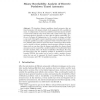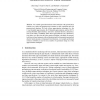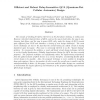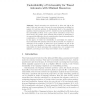201 search results - page 3 / 41 » Reducing the number of clock variables of timed automata |
FUIN
2008
13 years 5 months ago
2008
This paper is concerned with the universality problem for timed automata: given a timed automaton A, does A accept all timed words? Alur and Dill have shown that the universality p...
CAV
2000
Springer
13 years 10 months ago
2000
Springer
We introduce discrete pushdown timed automata that are timed automata with integer-valued clocks augmented with a pushdown stack. A con guration of a discrete pushdown timed automa...
COCOON
2001
Springer
13 years 10 months ago
2001
Springer
We consider generalized discrete timed automata with general linear relations over clocks and parameterized constants as clock constraints and with parameterized durations. We look...
DFT
2006
IEEE
13 years 9 months ago
2006
IEEE
The concept of clocking for QCA, referred to as the four-phase clocking, is widely used. However, inherited characteristics of QCA, such as the way to hold state, the way to synch...
FORMATS
2007
Springer
13 years 12 months ago
2007
Springer
Timed automata were introduced by Alur and Dill in the early 1990s and have since become the most prominent modelling formalism for real-time systems. A fundamental limit to the al...




